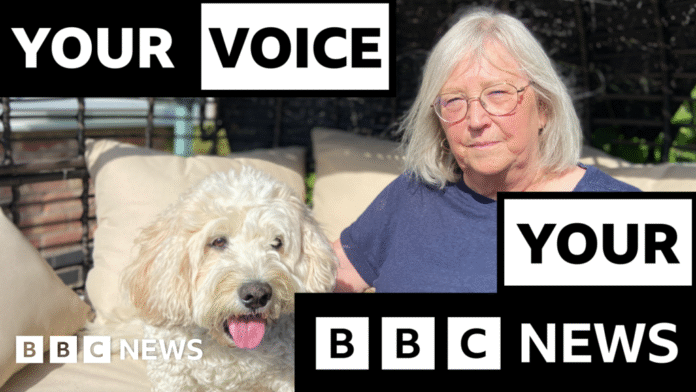BBC News Investigations
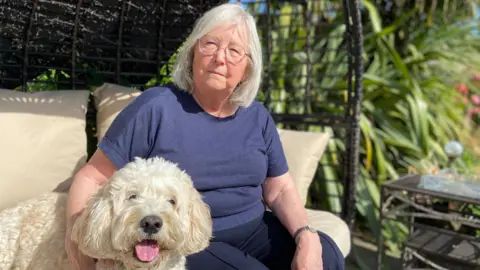 BBC
BBCPet owners are increasingly having their sick animals put down or they are delaying taking them for treatment to avoid spiralling vet bills, vets and animal charities have warned.
Some animal lovers are giving up pets to rehoming centres, while others have decided not to own any more in the future due to high costs, the BBC has been told.
Many veterinary surgeons and nurses say treatment prices have been pushed up after big corporations have bought up practices.
The British Veterinary Association (BVA) said the cost of care had increased for a variety of reasons and fees reflected the prices businesses needed to charge to remain financially viable and open.
Now Dougie has gone deaf and Avril worries his condition may have got worse because she cut back on follow-up appointments due to the cost.
She said she’s gone through “a lot of soul searching”, adding that at times she worries not taking him is to blame.
“At least I’m still hanging in there and get to keep him,” she said, but added she felt “desperately sorry for those people who have given up their pet”.
Caroline also got in touch after paying more than £4,500 to treat her 19-year-old cat Ozzie when she was diagnosed with a brain tumour.
The bill was so expensive she could not afford to cremate Ozzie after the cat died – so instead she brought her home and buried her in the back garden.
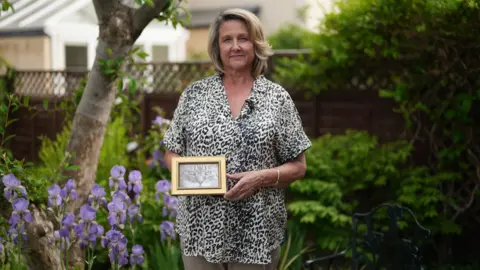
She said the cost of treating Ozzie, who died in 2022, was so high it has put her off owning another pet.
“I’m currently in my early 60s and I don’t want to be 10 years down the line having to find £4,500,” she said.
“I don’t want the emotional upset of possibly not being able to afford it and then having to ask for somebody to rehome the cat as well.”
Animal welfare charity Blue Cross warned increased treatment costs are a “ticking time bomb” for the welfare of pets.
“Access to affordable vet care has reduced and we’re seeing more animals not getting the treatment they need and even being relinquished because their owners can no longer afford to keep them,” said Paul Manktelow, director of veterinary services for the charity.
Blue Cross runs a fund for people who can’t afford emergency care and it’s seen a 264% increase in applications in the past year, going from 1,319 in 2023 to 4,807 in 2024.
The BBC has spoken to 25 veterinary surgeons, nurses and industry insiders working for a range of companies and the majority blamed higher vet bills on big companies buying up practices.
One said life became “hellish” when their practice was taken over. Another said a regional manager bought them a cake when they hit their financial targets, which “went down badly” with staff, who were busy and covered in animal blood and urine at the time.
Only one person did speak to us publicly because others feared never working again. Locum vet Dr Callum Ladell, who has worked at more than 250 practices, says public trust in vets has been lost and he is seeing fewer clients bringing in their animals for treatment because they are expecting a big bill.
“We’re having cases come in, having been left for months and months, and normally, it ends up being euthanasia – putting an animal to sleep – because they can’t afford the bill and because it works out cheaper than fixing them,” he told the BBC.
The British Veterinary Union in Unite (BVU) – which represents workers in the industry – says people are increasingly choosing to euthanise their pets due to cost pressures, even when there are other medical options available.
A survey of 10,000 cat owners by the charity Cats Protection found 58% did not visit the vet as often as they would like, with cost described as the biggest barrier.
Dr Ladell said he treated a friend’s cat, called Elvis, who suffered a wound to his leg in May.
He sedated the cat, cleaned out the wound and stitched it up at a cost of £93.19. This didn’t include his clinical time, which he estimated would have added £300 to the bill.
The cat later opened up the wound – making it larger – and this time, Dr Ladell took him to the practice at which Elvis was registered, which is owned by the corporate chain CVS.
The case notes and final bill, which have been seen by the BBC, showed vets treated the cat under full anaesthetic, removed tissue, reopened the wound, flushed it out, put a drain in and stitched it up. The bill came to £1,074.54.
Dr Ladell didn’t criticise the quality of care received but said he feels more cost-effective treatment could have been done with an equally good outcome, particularly if the owner was not someone who could afford more than £1,000 for this “gold standard” service.
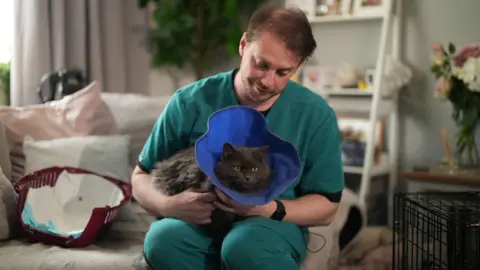
CVS, which owns around 500 veterinary practices across the UK and Australia, said the two procedures were not comparable.
A spokesperson said: “It would be incorrect for us to comment publicly on an individual case as we are bound by confidentiality rules. It would also be unprofessional for us to compare the high-quality treatment we offer with another member of the veterinary profession, particularly if the level of surgical intervention is very different.”
In 2013, only 10% of vet practices in the UK were owned by large corporate groups.
The Competition and Markets Authority (CMA) said six large corporate vet groups – IVC Evidensia, CVS, Medivet, Pets at Home, Linnaeus, and Vet Partners – now account for 60% of the market.
Bills for pet owners have risen as corporate ownership has increased – by more than 60% – between 2015 and 2023, figures from the CMA show. This is almost double the rate of inflation or the increase in vet salaries over that time.
The CMA is currently investigating whether a lack of competition in the veterinary sector has contributed to soaring prices.
Seven vets at practices owned by IVC Evidensia told File on Four Investigates they were monitored and subject to targets set by the company.
One said he and his colleagues were encouraged to compete against other practices owned by IVC over the number of certain procedures they carried out on animals, through what the company called “clinical challenge milestones”.
IVC said the health and welfare of animals was always its first priority and stressed these “clinical challenge” targets weren’t financial but designed to improve the clinical care of pets. The selected procedures, it says, are all carefully chosen because they are essential to ensuring a prompt diagnosis and stabilisation of emergency patients.
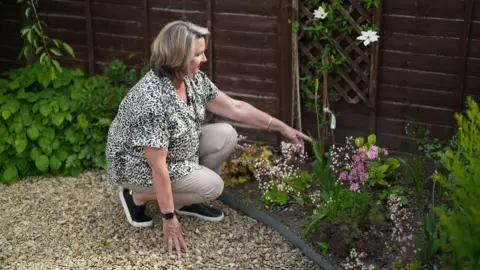
Corporate vet chains have said there are a variety of reasons why vet costs have increased – including advances in treatments, rising running costs and demands from pet owners for higher standards.
The CMA has put forward suggestions of changes designed to make veterinary services more affordable – including price caps on medicines, prescriptions and other services like cremations.
The British Veterinary Association (BVA), the vet union BVC and veterinary staff all agree regulation of the industry needs to be updated.
However, the BVA said the CMA’s proposed remedies may have the “unintentional consequence of reducing consumer choice and potentially increasing vet fees”.
“If owners are concerned about cost, speak to your vet because they will always prioritise the welfare of the animal in their care and work closely with owners to find treatment plans that work for their circumstances,” said British Veterinary Association president Dr Elizabeth Mullineaux.
The CMA was due to publish its final report towards the end of the year, but that’s been delayed by three to six months due to the volume and complexity of feedback from vets on its proposed changes.
Caroline says she can’t bring herself to remove the cat flap she had for Ozzie, because that completely closes off ever having a pet.
However, she insists that even though she loves having animals around, the cost of looking after one means she is going to “fight the urge to get another pet”.




